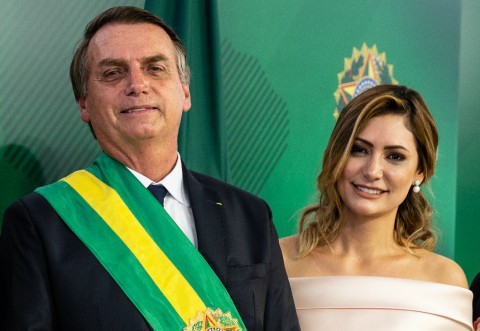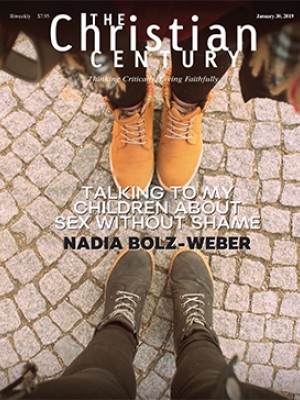Brazil’s new president begins term with support of conservative Christians
Jair Bolsonaro created a Christian voting bloc through opposition to what he called a liberal moral drift.

The cabinet members of Brazil’s new president, Jair Bolsonaro, are often cited to explain his victory at the polls: they are active or retired members of the armed forces, free-market economists, and ultraconservative Lutheran, Catholic, and evangelical Christian politicians.
This support from the Christian right, along with his unbridled opinions and social media attacks, have caused many to see the twice-divorced Bolsonaro as the Trump of South America. But while Trump won with the help of a well-established evangelical constituency, Bolsonaro, a retired army captain, created his Christian voting bloc through opposition to what he called a liberal moral drift.
Read our latest issue or browse back issues.
In the early 1990s, Bolsonaro went from being an undisciplined middle-ranking officer—whose only fame came when he tried to organize a barracks campaign to raise wages—to a congressman known mostly for his defense of Brazil’s repressive military dictatorship which ended in the mid-1980s. He was not shy about granting interviews, often making headlines.
He said in a 1999 television interview that he is in favor of torture and that Brazil would change only in civil war, when “we fulfill the task that the military regime has not completed: killing about 30,000 people.”
In 2016, Bolsonaro, a Roman Catholic, joined a group of evangelicals on a trip to Israel and agreed to be baptized by a Pentecostal pastor in the waters of the Jordan River.
That same year, center-left president Dilma Rousseff of the Workers’ Party, known by the acronym PT for its name in Portuguese, was ousted from the presidency by the federal legislature, accused of manipulating the government budget.
Bolsonaro declared himself the protector of the Brazilian family. He blamed PT politicians for the “moral decay” of Brazilian youth, focusing on the school system’s sex education classes and the teaching of gender “ideology” to teenagers.
The PT had inherited the curriculum when it took control of the presidency in 2003. But in 2011 the administration produced a new textbook and audiovisual material called School without Homophobia aimed at raising awareness about sexual diversity.
Rousseff had rejected the curriculum, but in the recent campaign her secretary of education, Fernando Haddad, was PT’s candidate for president, giving Bolsonaro the opportunity to campaign against it anyway. Arguing that “the communists want to convert children to homosexuality,” he called it “the gay kit.” Haddad became the “gay kit candidate.”
Pentecostals, who make up less than a third of the electorate, gave 70 percent of their vote to Bolsonaro. Catholics, who make up 56 percent of voters, were closely divided, giving a slight advantage to Bolsonaro.
“LGBTQ activists apparently cast off any idea of democratic coexistence,” said Luiz Sayão, a prominent pastor and biblical scholar. “They think their opinions must be transformed into state policies and the rest of us should keep quiet.”
Asked why evangelicals aligned with Bolsonaro, Altair Germano, an Assembly of God pastor, pointed to “abortion, deconstruction of traditional family, and sexual indoctrination of children in schools.”
Brazilian evangelicals only recently abandoned the PT’s leaders, according to Edin Sued Abumanssur, a religion sociologist at the Pontifical Catholic University of São Paulo. And whatever their actual influence at the polls, conservative Christians believe they pushed Bolsonaro over the line and their expectations are high.
“Evangelical leaders try to convince the new people in charge that they were responsible for their victory,” Abumanssur said. “Let’s see how long their alliance will survive. It’s politics.”
Leonardo Boff, a leading figure in the liberation theology movement, attributes the success of evangelical churches in the historically Roman Catholic country to a scarcity of Catholic priests.
“We needed something like 90,000 priests, and we can only count on 20,000, most of them foreigners,” Boff said. “There are big voids.”
Meanwhile, Pentecostal churches such as the Universal Church of the Kingdom of God have used their newfound prosperity to invest in radio and TV stations and then used them to influence politics.
As a symbol of this increasing influence in Brazilian society, Bolsonaro took on an almost mystical quality. With days to go before the vote, Bolsonaro was stabbed during a campaign rally by a mentally unstable man. He survived after extensive surgery, from which he is still recovering.
“The assault contributed to build his image as a savior—for many Christians, he became a myth, a messiah,” said Jung Mo Sung, a professor at the Methodist University of São Paulo.
Paulo Lockmann, a United Methodist bishop, accused many evangelical leaders of operating cynically.
“One can say they take a ride on the unconscious collective, on the people’s need for a redeemer,” he said. —Religion News Service
A version of this article appears in the print edition under the title “Brazil’s new president begins term with support of conservative Christians.”





